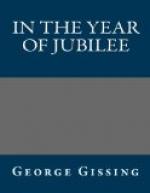Fanny French began to regret that she had not realised her capital, and put it into the Association. Wishing at length to do so, she met with a scornful rebuff. Beatrice would have none of her money, but told her she might use the shop like any other customer, which of course Fanny did.
Mrs. Peachey, meanwhile, kept declaring to both her sisters that they must not expect to live henceforth in De Crespigny Park on the old nominal terms. Beatrice was on the way to wealth; Fanny moved in West End society, under the chaperonage of a rich woman; they ought to be ashamed of themselves for not volunteering handsome recognition of the benefits they had received beneath their sister’s roof. But neither Beatrice nor Fanny appeared to see the matter in this light. The truth was, that they both had in view a change of domicile. The elder desired more comfort and more independence than De Crespigny Park could afford her; the younger desired a great many things, and flattered herself that a very simple step would put her in possession of them.
The master of the house no longer took any interest in the fortunes of his sisters-in-law. He would not bid them depart, he would not bid them stay, least of all would he demand money from them. Of money he had no need, and he was the hapless possessor of a characteristic not to be found in any other member of his household —natural delicacy.
Arthur Peachey lived only for his child, the little boy, whose newly prattling tongue made the sole welcome he expected or cared for on his return from a hard day’s work. Happily the child had good health, but he never left home without dread of perils that might befall it in his absence. On the mother he counted not at all; a good-tempered cow might with more confidence have been set to watch over the little one’s safety. The nurse-girl Emma, retained in spite of her mistress’s malice, still seemed to discharge her duties faithfully; but, being mortal, she demanded intervals of leisure from time to time, and at such seasons, as Peachey too well knew, the child was uncared for. Had his heart been resolute as it was tender, he would long ago have carried out a project which haunted him at every moment of anger or fear. In the town of Canterbury lived a sister of his who for several years had been happily wedded, but remained childless. If the worst came to the worst, if his wife compelled him to the breaking-up




